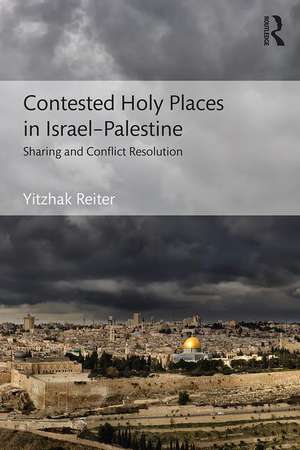Contested Holy Places in Israel–Palestine: Sharing and Conflict Resolution
Autor Yitzhak Reiteren Limba Engleză Paperback – 11 apr 2017
This book seeks to understand the many facets of disputes and the triggers for the outbreak of violence in and around holy sites. It analyses fourteen case studies of conflicts over holy sites in Palestine/Israel, including major holy sites such as Al-Haram al-Sharif/the Temple Mount, the Western Wall and the Cave of the Patriarchs/Al-Ibrahimi Mosque in Hebron, in addition to disputes over more minor sites. It then compares these conflicts to similar cases from other regions and provides an analysis of effective and ineffective conflict mitigation and resolution tools used for dealing with such disputes. Furthermore, the book sheds light on the role of sacred sites in exacerbating local and regional ethnic conflicts.
By providing a thorough and systematic analysis of the social, economic, and political conditions that fuel conflicts over holy sites and the conditions that create tolerance or conflict, this book will be a key resource for students and scholars of conflict resolution, political science, and religious studies.
| Toate formatele și edițiile | Preț | Express |
|---|---|---|
| Paperback (1) | 418.13 lei 6-8 săpt. | |
| Taylor & Francis – 11 apr 2017 | 418.13 lei 6-8 săpt. | |
| Hardback (1) | 1000.27 lei 6-8 săpt. | |
| Taylor & Francis – 11 apr 2017 | 1000.27 lei 6-8 săpt. |
Preț: 418.13 lei
Nou
Puncte Express: 627
Preț estimativ în valută:
80.01€ • 83.76$ • 66.20£
80.01€ • 83.76$ • 66.20£
Carte tipărită la comandă
Livrare economică 05-19 aprilie
Preluare comenzi: 021 569.72.76
Specificații
ISBN-13: 9781138243514
ISBN-10: 1138243515
Pagini: 346
Ilustrații: 18 black & white illustrations, 3 black & white tables, 18 black & white halftones
Dimensiuni: 156 x 234 x 22 mm
Greutate: 0.5 kg
Ediția:1
Editura: Taylor & Francis
Colecția Routledge
Locul publicării:Oxford, United Kingdom
ISBN-10: 1138243515
Pagini: 346
Ilustrații: 18 black & white illustrations, 3 black & white tables, 18 black & white halftones
Dimensiuni: 156 x 234 x 22 mm
Greutate: 0.5 kg
Ediția:1
Editura: Taylor & Francis
Colecția Routledge
Locul publicării:Oxford, United Kingdom
Public țintă
Postgraduate and UndergraduateCuprins
Introduction Part I: Challenging the Status Quo 1. The 1929 Western Wall Strife 2. Post 1967 Struggle over Al-Haram al-Sharif/Temple Mount 3. Intra-Christian Conflict at the Holy Sepulchre and Deir al-Sultan 4. (De)Constructing the Mughrabi Pathway 5. Breaking the "Custom of the Place" by the Women of the Wall Part II: Contesting Space and Representation at Holy Places 6. Imagining Holiness for Territorial Ends: Nachmanides Cave 7. The Plaza/Mosque Strife in Nazareth (Shihab al-Din) 8. Museumizing over the Dead: Mamilla Cemetery and the MOT 9. Judaizing David’s Tomb Part III: Demands to restore Past Rights 10. Diplomatic Challenge to the Status Quo at the Cenacle 11. The Beersheba Mosque/Museum 12. Restoring Pilgrimage to Mashhad Hussein in Ashkelon Part IV: Sharing Under Conflict 13. Sharing within Fighting: Hebron’s Shrine 14. Sharing and Co-existing at the Tomb of Samuel/Samwil Conclusion
Notă biografică
Yitzhak Reiter is a professor of Middle East, Israel, and Islamic Studies. He chairs the Department of Israel Studies and is Head of the Research Authority at Ashkelon Academic College. He is a senior researcher at both the Jerusalem Institute for Policy Research and the Harry S. Truman Institute for Peace Research at the Hebrew University of Jerusalem.
Descriere
Religious leaders and political actors often use holy places to rally citizens to 'protect' or 'liberate' national territory as 'hallowed land.' The Holy Land, Palestine or Eretz-Israel, is the most obvious case of the process of 'religionizing' ethnic, national and territorial conflicts. This book analyzes fourteen case studies of conflicts over holy sites in the Holy Land, each representing a particular archetype of conflict. It seeks to understand the many facets of disputes and the triggers for the outbreak of violence in and around such sites. It also analyses the effectiveness of the conflict mitigation and resolution tools used for dealing with such disputes.
